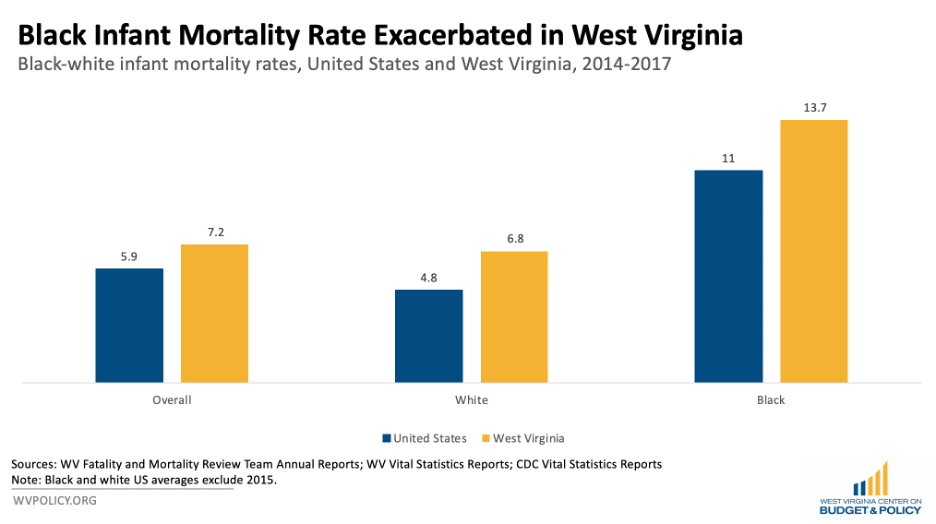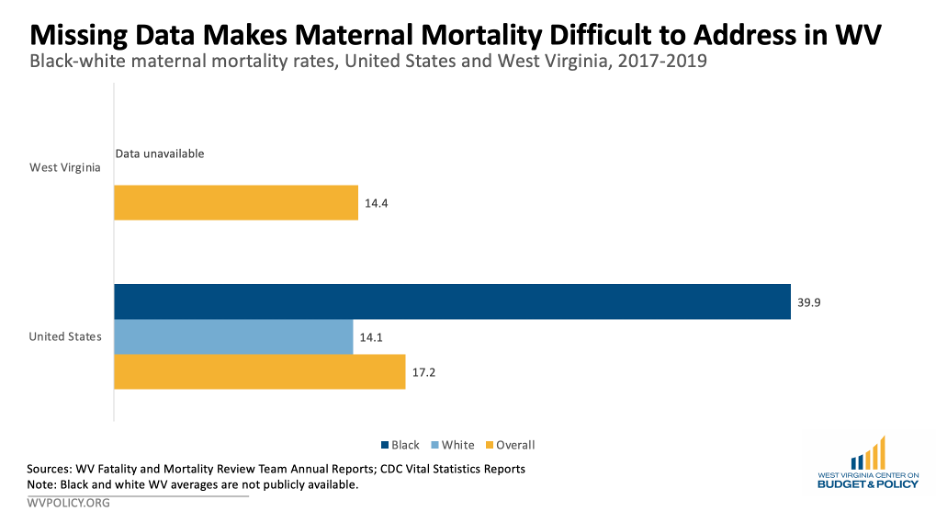Infants and birthing parents are dying at alarming rates in West Virginia. Infant and maternal mortality rates are essential statistics measuring overall societal health. In particular, the disparities in life outcomes between Black and white babies and mothers raise questions about health equity and the ability of our health care system to respond to both babies’ and mothers’ needs meaningfully. Existing gaps in the available relevant data, especially on the state level, limits experts’ capacity to make policy recommendations that appropriately respond to this critical issue. Meanwhile, West Virginians continue to die often preventable deaths. The Mountain State must address the issues of infant and maternal mortality immediately, which includes producing nuanced data and implementing evidence-based policies. It is a matter of life or death.
The infant mortality rate measures the number of deaths in children under a year old per 1,000 live births. Between 2014 and 2017 (the most recent multi-year data available in the state), West Virginia’s infant mortality rate was 7.2 deaths per 1,000, outpacing the national rate of 5.9 deaths per 1,000. When controlling for race, the state’s white infant mortality rate was only 6.8 deaths per 1,000, while the Black infant mortality rate was 13.7 deaths per 1,000 over the same period. Plainly stated, Black babies in the Mountain State were twice as likely as their white peers to die in their first year.

Alt-text: Bar graph showing the overall, white, and Black infant mortality rates in the United States and West Virginia between 2014 and 2017, where the Black infant mortality rate doubled the white infant mortality rate in West Virginia.
The infant mortality rate has decreased over the past several decades, but racial disparities persist despite health care advancements. Some leading causes of infant mortality include low birth weight, birth defects, maternal health complications, and sudden infant death syndrome (SIDS). High-quality pre- and post-natal care can be crucial in mitigating these factors contributing to infant death and improving outcomes significantly. However, a lack of access to health care is a pervasive issue for many West Virginians, especially for Black folks in rural parts of the state.
In 2019, the Black uninsured rate was 10.1 percent in West Virginia, two percentage points higher than the white uninsured rate. In several rural counties, the Black uninsured rate was over 20 percent. Even with health insurance, many struggle to find adequate care within their communities. For example, West Virginia is facing an obstetrics care crisis. As of 2022, 37 of the 55 counties in the state did not have hospital birthing centers, requiring many to travel long distances to receive necessary care. Most of the state lacks the workforce and infrastructure to adequately care for infants and prevent complications that make their survival less likely.
Further, evidence shows that the doctor-patient relationship plays a significant role in life outcomes for Black infants. Racial bias and structural racism in the health care system shape how Black mothers and infants receive care. A study published in the Proceedings of the National Academy of Sciences found a positive correlation between having a Black doctor and Black infants’ survival rate. Though the data has limitations, this study found that being cared for by a Black doctor correlated with a nearly 50 percent decrease in Black newborns’ mortality rate. Existing health policy fails to challenge and address racial disparities despite ample evidence outlining its significant role in Black babies’ survival rate.
The maternal mortality rate measures the number of maternal deaths related to or aggravated by pregnancy per 100,000 live births. Between 2014 and 2019, the maternal mortality rate in the US was 17.3 deaths per 100,000. During that period, West Virginia reported 14 deaths per 100,000. Though the state reports a figure slightly lower than the national average, much relevant data is missing, making it impossible to fully understand how pervasive the issue is in various communities. Notably, this state data is not broken down by race, so researchers must rely on inferences from national data and anecdotal state evidence.
Between 2017 and 2019, the US reported 14.1 white maternal deaths per 100,000. Black women faced a mortality rate nearly three times as high, with 39.9 Black maternal deaths per 100,000. This racial disparity has existed for decades. Even when controlling for educational attainment and income, Black mothers are nearly three times more likely to die within a year of childbirth than their white peers. This severe gap is harrowing and indicative of deeply ingrained racial and structural problems that no level of access to care has meaningfully addressed thus far.

Alt-text: Bar graph showing Black-white maternal mortality rates in West Virginia and United States between 2017 and 2019, where West Virginia does not have disaggregated racial data.
There are many concerning unknowns related to maternal mortality in West Virginia, making it incredibly difficult to shape nuanced policy responsive to the needs of mothers across the state. National statistics collected during the COVID-19 pandemic indicate that the racial disparity in maternal mortality has only widened in recent years, illustrating the compound effects of long-standing health care inequity. While it is clear that the elevated uninsured rate among rural Black West Virginians and the state’s obstetrics care shortage impede access to necessary pre- and post-natal care, national data indicates these factors are not the only ones contributing to Black maternal mortality.
The West Virginia Legislature did not pass any maternal or infant health bills during the 2023 legislative session, but several were introduced. Senate Bill 479 would have expanded doula care for pregnant people who received health care via Medicaid. Doulas offer holistic health care services and have positive impacts on infant and maternal health outcomes. A study published by the National Institute of Health found that people who receive doula care had better birthing experiences, felt more confident throughout their pregnancies, and were less likely to experience postpartum depression. SB 479 did not pass either chamber. Other bills addressing infant and maternal health, like the Dignity in Pregnancy Act and the Family and Medical Leave Insurance Benefits Act, gained no momentum.
Without more detailed data, it is impossible to precisely understand maternal mortality trends in West Virginia and how significantly Black and other minority mothers are harmed by the problem. While we lack some state-level data, the racial disparities in infant and maternal deaths in our state and around the country are undeniable. Eliminating these racial inequities requires advocates, government leaders, and those most impacted to come together to demand an explanation for the missing data and put forth community-rooted ideas for solutions.